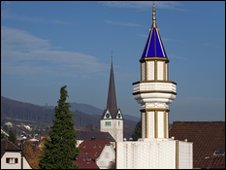 My question for Switzerland and other European countries enthralled by the right wing: When did Saudi Arabia become your role model?
My question for Switzerland and other European countries enthralled by the right wing: When did Saudi Arabia become your role model?Even before 57.5 percent of Swiss voters cast ballots on Sunday to ban the building of minarets by Muslims, it was obvious that Switzerland's image of itself as a land of tolerance was as full of holes as its cheese. When the right-wing Swiss People's Party (SVP) came to power in 2007, it used a poster showing a white sheep kicking black sheep off the country's flag. This was no reference to black sheep as rebels -- the right wing doesn't do cute -- but to skin color and foreigners. Posters the SVP displayed before Sunday's referendum showed women covered from head to toe in black, standing in front of phallic-looking minarets. Such racism preceded and fed into the bigotry that fueled the referendum.
Predictably, the election results sparked cries of "Islamophobia," but the situation for Switzerland's 400,000 Muslims is not (yet) dire. The four existing minarets were not affected by the vote, and there are still 150 mosques or prayer rooms in which to worship.
Further, the Council of Europe, the continent's top human-rights watchdog -- whose chairmanship, ironically, Switzerland recently took over -- has already said the ban could violate fundamental liberties, and the Swiss justice minister said the European Court of Human Rights could strike down the vote.
But the real issue here is more fundamental than whether or when Muslims can build minarets in Switzerland. Until Europe confronts long-simmering questions about how it treats immigrants -- Muslims and others -- the continent will continue to convulse with embarrassing right-wing eruptions that strip it of any right to preach to anyone on human rights and liberties.
Europe is an aging continent that depends on the "foreigners" its right-wing politicians love to rail about. In Switzerland, for example, it's difficult for immigrants and even their children to get citizenship.
As a Muslim who believes in the separation of church (and mosque and synagogue) and state, I pay attention when people say they are opposed to political Islam. But to suggest, as nationalist parties in Switzerland did, that minarets are symbols of political Islam is ridiculous.
Minarets are used to issue the call to prayer, not to recruit people to Islamic political groups. If the SVP finds such prayer calls too noisy, I'd like to see it try to stifle church bells.
Raising the specter of "political Islam" or "creeping Islamicization" to frighten voters diminishes the concerns that ought to be discussed, such as an ideology's opposition to many minority and women's rights. And that's where the difficult questions lie for Europe's Muslims. They, too, have a right wing that breeds on fear and preaches an exclusionary and inward-looking Islam. It is the perfect foil for the non-Muslim political right wing on the continent. But while these conservative Muslim views might hold some moral sway, they have none of the political power of the SVP and its cohorts.
Meanwhile, condemnations from the Muslim world -- where some have semi-jokingly called for a boycott of Swiss chocolate -- underscore the other sort of hypocrisy that must be confronted if Muslim complaints of bigotry are to be taken seriously.
The Grand Mufti of Egypt, for example, denounced the ban as an "attack on freedom of belief." I would take him more seriously if he denounced in similar terms the difficulty Egyptian Christians face in building churches in his country. They must obtain a security permit just for renovations.
Last year, the first Catholic church -- bearing no cross, no bells and no steeple -- opened in Qatar, leaving Saudi Arabia the only country in the Persian Gulf that bars the building of houses of worship for non-Muslims. In Saudi Arabia, it is difficult even for Muslims who don't adhere to the ultra-orthodox Wahhabi sect; Shiites, for example, routinely face discrimination.
Bigotry must be condemned wherever it occurs. If majority-Muslim countries want to criticize the mistreatment of Muslims living as minority communities elsewhere, they should be prepared to withstand the same level of scrutiny regarding their own mistreatment of minorities. Millions of non-Muslim migrant workers have helped build Saudi Arabia. Human rights groups have long condemned the slave-like conditions that many toil under, and the possibility of Saudi citizenship is nonexistent. Muslim nations have been unwilling to criticize this bigotry in their midst, and Europeans should keep in mind that Sunday's ban takes them in this direction.



